
Lizards are undoubtedly fascinating creatures with so much variety. From horn lizards to fire skinks, there’s something for everyone.
Many of these 6000 species of reptiles are incredibly smart in adapting to their environment.
Do you know why lizards are more active at night? Have you ever seen a gecko sprinting across your bedroom walls? It’s because they are nocturnal animals.
This means they are naturally inclined to be more active when the sun is down.
Why do Lizards come out at night? What type of lizards comes out at night, and how can you repel them? Don’t worry! This blog post will provide you with comprehensive answers to all your queries.
Lizards are striking creatures with a great variety of species. Some lizards are active during the day, while others come out at night due to their circadian rhythm.
Lizards come out at night to avoid predators, regulate their temperature, and look for food.
Among various species, geckos, chameleons, and agamas are examples of lizards that are nocturnal and crepuscular, meaning they are out and about during the night or twilight hours.
There are various ways to keep lizards away from your home, the most effective of which is reducing the number of insects around your property.
Read on for a comprehensive guide about what types of lizards come out at night, why, and how you can repel them.
The next section of this article will explain why lizards are active at night, followed by a brief explanation of various species that are more active at night and how you can effectively repel them. Lastly, there will be a brief conclusion and frequently asked questions about lizards.
Reasons Lizards Come Out at Night
Some lizards are active only during daylight; on the other hand, nocturnal species wait for night.
As a result, they have evolved to experience a unique circadian rhythm different than their diurnal cousins.
Below are the main reasons lizards come out at night.
Temperature Regulations
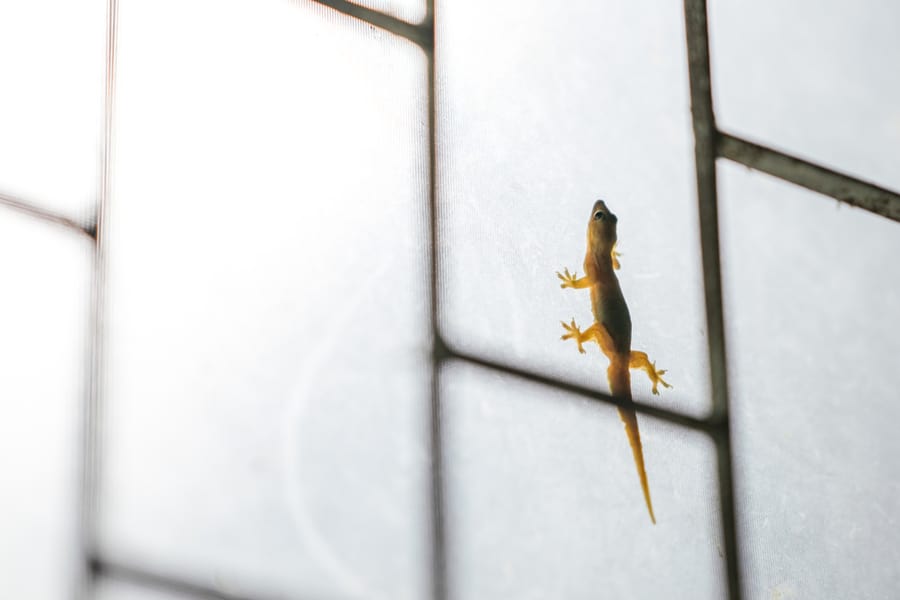
Even the most ordinary lizard on your wall at night can feel just as comforted and relaxed as you do when robed in a cozy sweater.
It’s not because lizards resist the chill but because they are nocturnal, and nights are as comfortable for them as days for you.
Many lizards are ectothermic, which means the environment regulates their body temperature instead of internally, like mammals.
As the sun shines, its rays can generate oppressive heat, making it unbearable for lizards to move around throughout the day.
When the sun sets and the temperature drops, it’s easy for these nocturnals to move about their habitat.
Avoiding Predators

While daytime can be a lot of fun, sometimes it’s best to avoid it.
That’s the approach lizards take to evade their natural predators, such as birds, serpents, and mammals. This can also be seen in the wild.
Thus, due to the more activity of birds during the day and the presence of other predators, it can be unsafe for lizards if they come out in the daytime.
So they minimize their chances of becoming prey by only coming out at night.
Looking for Food
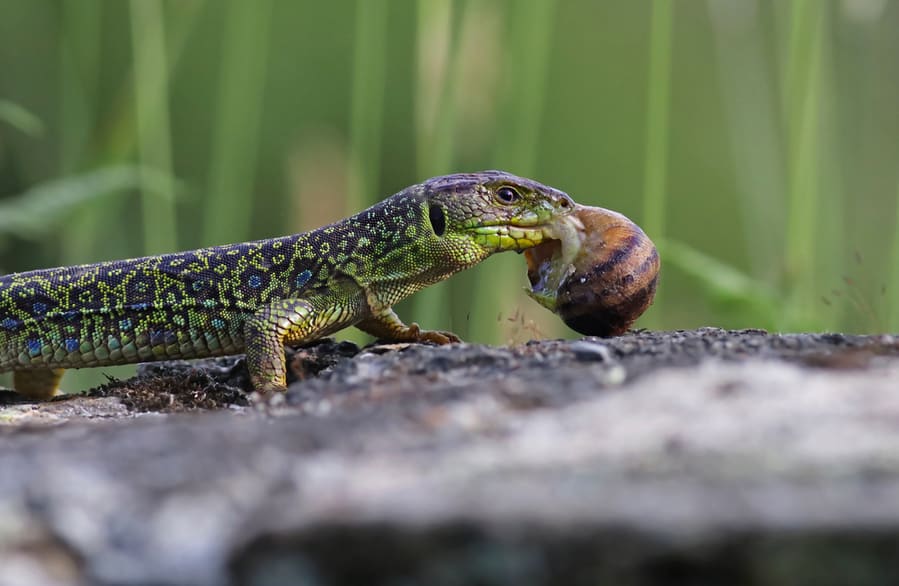
Have you ever noticed that when the sun sets, lizards seem to disappear?
That’s because many lizards come out at night to forage for food since their main diet includes small insects, and it’s easier to capture these prey at night as insects tend to hover around lights.
Watching lizards hunt at night can be fascinating if you are lucky enough to see it. Fortunately, you can observe one of nature’s most exciting hunts with patience.
Types of Lizards More Active at Night
Different lizards have different circadian rhythms. Some are more active during the day, while other feel safe being active at night.
Among many lizards, the main species that are more active at night include:
Geckos
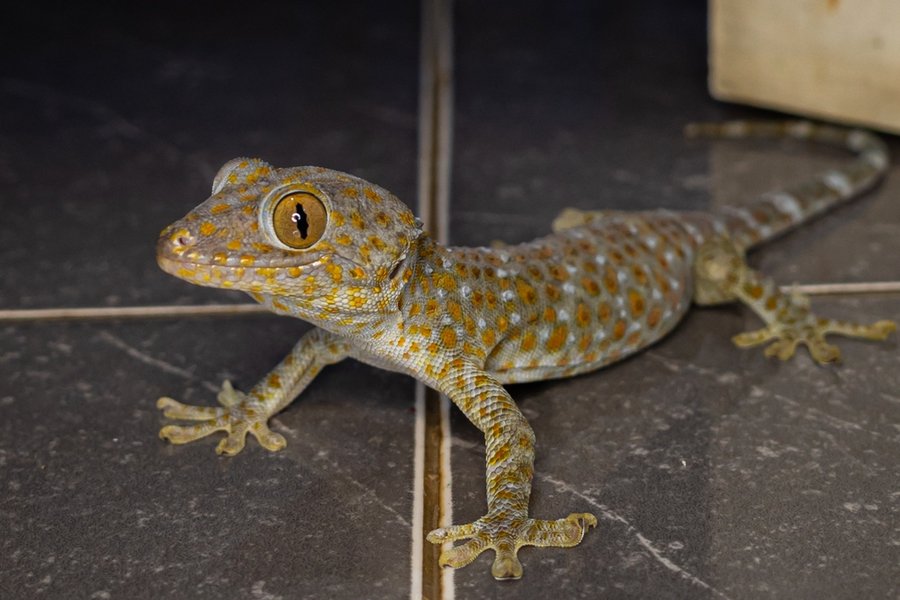
These charming creatures are known for their activity at night.
Among them, the most recognizable species is the house gecko which is native to tropical and subtropical areas. They are often found around homes.
Although they might be slippery while they scamper along walls and ceilings, they are especially well-known for their chirping noise.
So, if you are ever fortunate enough to hear such a noise while at home, there are chances it’s coming from one of these tiny lizards.
Chameleons
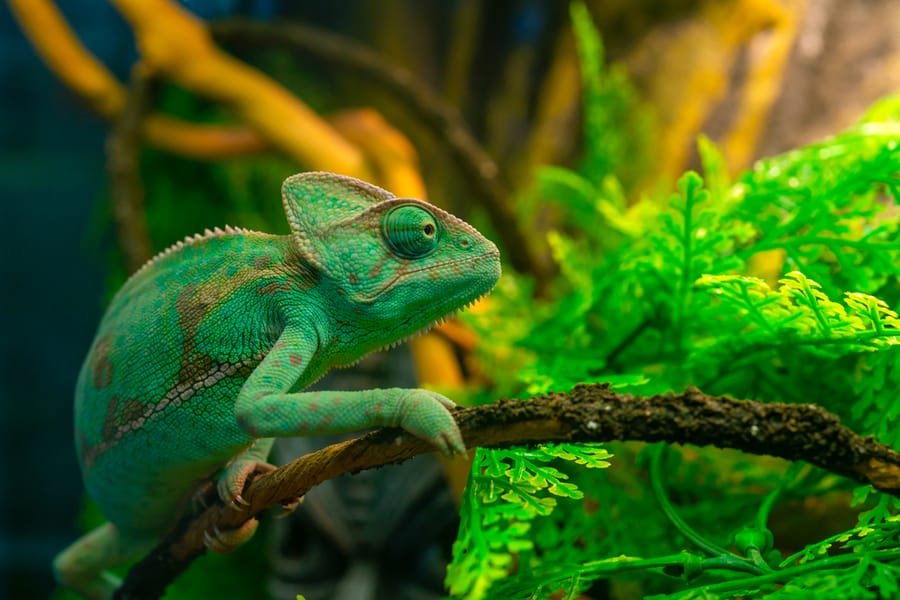
Chameleons are native to Madagascar and Africa.
They are primarily known for their nocturnal or crepuscular activity, as they are more active during twilight. Additionally, their unique appearance and behavior are also distinguishing factors.
Their ability to change their skin color in response to the environment and modes makes them stand out.
On top of that, they also have incredibly long protruding eyes that help them scan their surroundings in search of prey. No wonder these creatures have been the subjects of many stories and myths throughout history.
Agamas
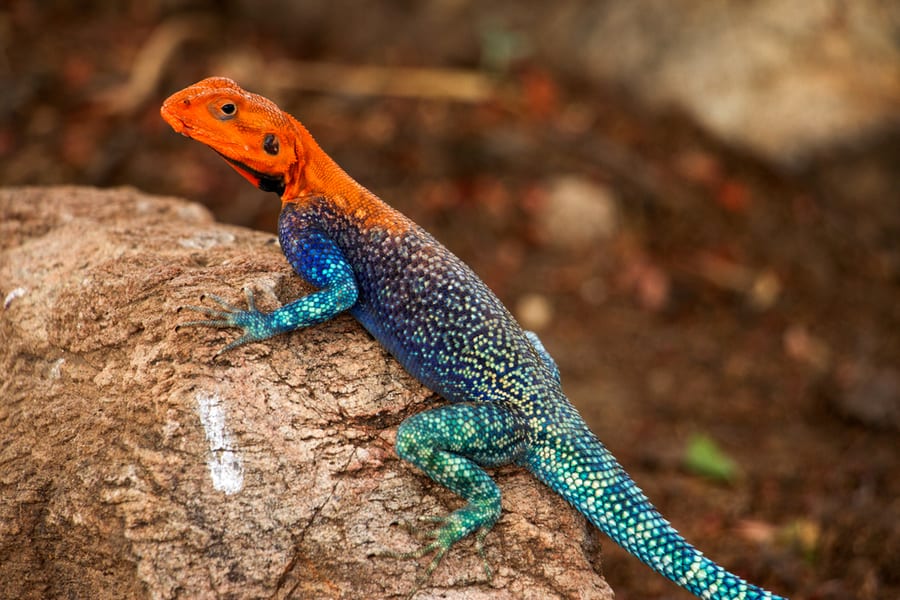
Agamas are truly unique and enchanting lizards.
They possess a distinctive look, with long slender bodies and triangular heads. They are also nocturnal and crepuscular, meaning they are more active at night.
They primarily feed on insects, as these lizards have adapted to be speedy runners and climbers, almost like living miniature dragons.
Agamas delight those who love lizards that can’t be found in any other species.
5 Effective Ways To Repel Lizards From Your Home
Are you seeking ways to rid your property of pesky lizards?
Taking action to prevent lizards from entering your home is a wise idea. Below are some successful strategies that you can practice.
1. Remove Their Food Sources

No one wants lizards in their home, so if you are looking for ways to keep them away from your house, reducing the number of insects around your property is a great place to start.
You can apply various methods to keep bugs away from your home, such as insecticides and traps or more effective solutions.
With the right approach, you can easily manage the bug population and, eventually, the lizards in your home.
Not only will this reduce the attraction lizards feel towards your home, but it is also a more sustainable pest control approach that protects both the environment and your home.
2. Take Advantage of Physical Barriers
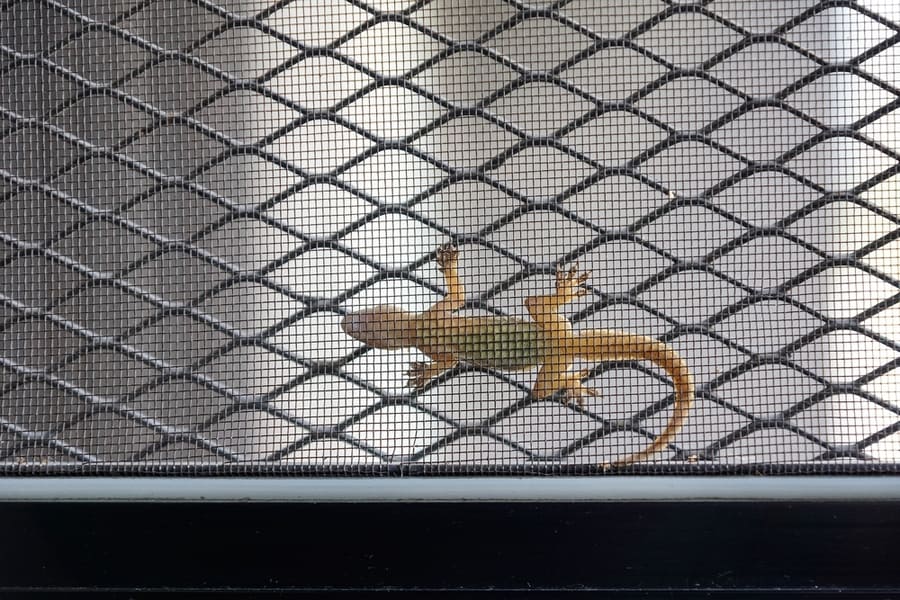
Lizards might seem tricky due to their ability to crawl through small openings, but those same cracks and services can also be used as the first line of defense against them.
Sealing all possible entry points with caulk or putty is a great start.
Installing mesh screens on your windows and doors will create an obscure barrier so no uninvited guests can enter your home.
3. Use Repellent Sprays

You can keep lizards away without harming them by using lizard-repellent sprays. Most of these sprays contain natural ingredients like peppermint and citrus oil, which are unpleasant to lizards.
These sprays are an easy and effective way to stay lizard-free in your home.
4. Use Lizard Trap
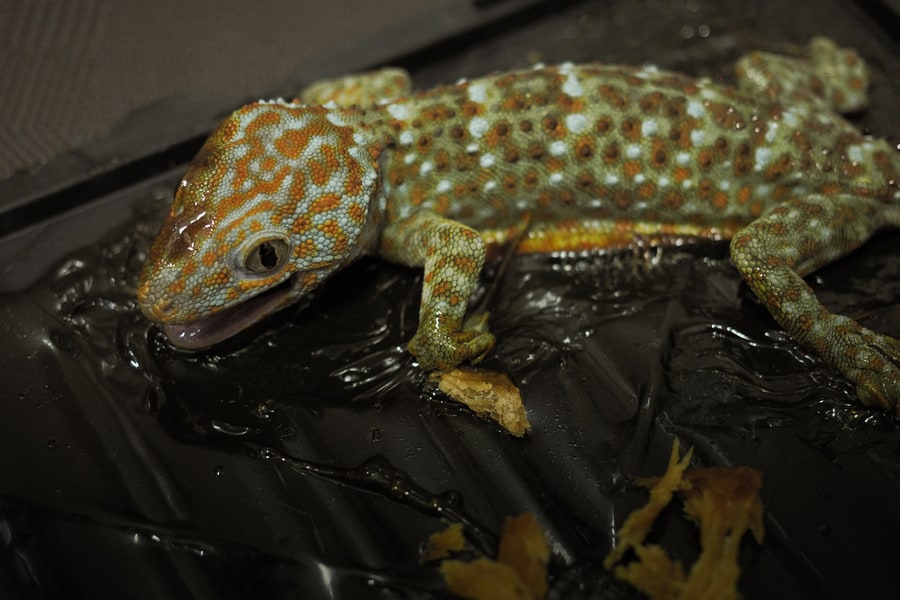
Lizards are naturally attracted to warm, humid environments like cozy kitchens and bathrooms, so getting rid of them can be challenging.
However, that does not mean it’s impossible.
It might be time to break out the lizard trap. These traps can easily capture lizards without any harm.
Different types of traps are available, including glue traps, live traps, and more, so find one that works for you and get those lizards out of your house in no time.
5. Use Natural Deterrents

Struggling to keep lizards away from your home? Try introducing natural deterrents.
You can use some simple things you likely already have at home. Placing aluminum foil, double-sided tape, cloves, and garlic around your house entry points can help keep lizards away.
The best part is you probably would not need to buy any extra items. How great is that?
Conclusion
Lizards come out at night for various reasons, including temperature regulations, avoiding predators, and searching for food.
While some lizards are strictly diurnal, others are more active at dusk or night. If you see a lizard during the day, the creature is likely basking in the sun to regulate its body temperature.
Managing lizards at home can be tricky, but things like keeping food stored away, trimming outside vegetation, and using certain sprays and repellents may help.
It’s important to remember that these creatures are an essential part of the ecosystem. Harming or killing them is not recommended.
Catch-and-release methods should always be preferred as a humane solution for you and the lizard alike.
Frequently Asked Questions
Are Lizards Harmful to Humans?
Generally, lizards are non-poisonous and harmless to humans.
However, a few species are venomous and should be avoided. The Gila monster and beaded lizards are among them.
How Do I Throw Off Lizards in My House?
There are several ways to eliminate lizards in your house, including removing their food sources, using physical barriers, using repellent sprays, using a lizard’s trap, and using natural deterrents.
Do Lizards Carry Diseases?
Even though lizards are considered safe disease carriers, practicing proper hygiene and washing your hands after interacting with any animal is always best.










